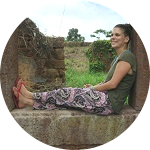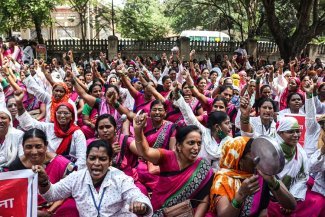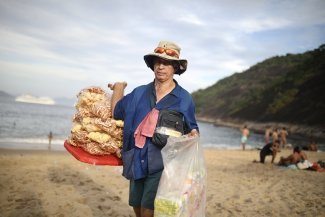
For nearly a decade, Leonice Tupari has been involved in various organisations working with indigenous peoples’ emancipation movements in the north of Brazil. In 2015, she founded an association aimed at strengthening the presence and voices of women within Amazonian communities.
They realised that their voices were not heard. Their demands did not reach their community leaders. Their concerns were of no importance but to themselves. But the wish to be represented in the decision-making processes regarding their communities united the indigenous women from the Brazilian state of Rondônia in their quest for knowledge that would enable them to transform this reality. This led to the creation, in 2015, of Agir (Associação das Mulheres Guerreiras Indígenas de Rondônia, or the Association of Warrior Women of Rondônia), an organisation that brings together more than 500 women from 27 different territories, including 54 ethnic groups from Rondônia.
Agir’s president, 41-year-old Maria Leonice Tupari, says that the movement was created with the aim of giving women a voice, not only within their communities but also at municipal, regional, national and even international level. “We no longer wanted to be left out of decision-making regarding our territories. Our representatives never invited us.”
These women have gained strength and their reality is not that of two years ago. Chauvinistic male attitudes remain, and women are often still seen as a threat, but certain breakthroughs are already visible. “We are not a threat. What we want is to advance together,” says Leonice, who is currently following a distance-learning university course. The daughter of Indigenous parents from the Tupari ethnic group, from the Rio Branco Indigenous territory in Alta Floresta, Leonice was interviewed by Maria Fernanda Ribeiro regarding the challenges and gains facing Indigenous women in their fight for their rights.
When did you and other women become aware of the need to create an association bringing together the Indigenous women of Rondônia?
Prior to setting up Agir, another association already existed but when its activities were wrapped up, quite a while ago, we ended up being deprived of representation in Rondônia. But because we always had women who never gave up the fight, we maintained a number of networking structures and carried on taking part in national meetings. Eventually, however, we felt the need for stronger state-level representation, to work with women towards improved awareness and knowledge [around the issues affecting them]. It became necessary, as more and more women would fail to turn up at the meetings; there were hardly any participants left. They didn’t appear to have any kind of interest left either. Only a strong organisation would be able to attract these women, to stir their interest. And we knew that it had to be a movement that extended beyond its leaders and embraced the grassroots. In 2015, we managed to turn our wish into a reality.
What is the aim of Agir?
Our aim is to empower women through knowledge, to be involved in discussions and decision-making within our communities. Prior to creating the association, we were very often sidelined. The decisions have always been taken by men; they never invited us to participate in anything. We want to be represented not only within our communities but also at municipal, regional, national and even international level.
What were the first actions undertaken by Agir?
We needed a diagnosis, to be able to understand what our women wanted. We had to go into the communities, to listen to the grassroots. We managed to visit 16 Indigenous territories, to identify the main issues, and we are currently pursuing a solid empowerment agenda based on access to knowledge and skills.
And what was the outcome of the diagnosis?
The main issue women are looking into is Indigenous handicraft. Not only is it an integral part of the culture but it is also a source of income for the communities and affords them a degree of independence. Another issue of particular concern is health. We insist on food security as in many villages food is no longer what it used to be; it is industrially processed. And that is something that worries them a great deal. Another matter of concern is land management, as without land, it is impossible to fight for access to health, education or anything else. Although we live in different places, we share the same feelings.
For women who are not integrated, what are the implications when it comes to decision-making?
All of us, men and women alike, greatly suffer the impacts of the mining and forestry industries on the Indigenous territories. But we as women are even more affected because most of the time it is the men who make the decisions and they don’t always inform us of what is going on, and by the time we find out, the repercussions are already there.
For instance, there is the issue of prostitution within the communities. Men open the community space to prostitutes and prostitution also exists among Indigenous women, which has led to the spread of illnesses. There are many cases of men leaving their Indigenous wives for women from elsewhere. The women are left to look after the children, having to raise two, four, seven or as many as eight children while the men are out there having a good time.
The destruction of the forest has had an impact on women earning their living through handicraft, as they are finding it increasingly difficult to source the materials they require from the deforested areas. The rivers are contaminated and we are also the ones who go out to fetch the water. Violence is also on the rise as gold panning usually leads to alcohol and drug consumption, which in turn gives rise to violence against women.
Do cases also arise of Indigenous lands being leased?
Land leasing is widespread in our state, including by Indigenous landowners that have become acquainted with capitalism and are prepared to lease their property for a pittance. That is also why we as women are organising, because we are opposed to that. It is thanks to our knowledge-based empowerment that we are going to show our husbands that we are prepared to defend our lands. And that is where the difference lies between us women and them. We as women think collectively. Obviously, all men are not involved in gold panning or deforestation, as they too are worried, but a small minority alone can cause serious harm.
A minority is therefore capable of having a strong impact?
Absolutely. Let’s take the issue of mining, for instance. Even though few people are involved, the politicians are there, making their presence felt. And when Indigenous people are in favour of mining, they will clearly receive their backing. Meanwhile, those who defend our interests cannot count on the same sort of support, as the government itself is very often unwilling to offer its protection. What they want above all is to open the doors to mining.
What type of support do you get from men?
When we created the association, the men supported us, although when we started raising questions about decisions that had been made, some realised that, unlike in the past, there was now a groundswell of head-on opposition to their methods, saying: “No, you are not going to decide by yourselves. We too want to be involved.” Which is why some of them feel somewhat threatened. I don’t understand why, because we are not a threat. What we want is equality, an equality that should apply to decision-making. We want to stand by them in this struggle and not be left out. We are pressing for the participation of women in decision-making, especially those regarding our land rights. That is what we want.
And have you already seen signs of progress in the two years since the creation of Agir?
At our first meeting in 2016, 40 women attended. At this year’s meeting, there were already 100 women. That represents huge progress. It should also be pointed out that we had limited resources at our disposal and that we could not invite all the women who wanted to take part. I feel that women are starting to understand and want to learn more.
And has there been any progress regarding men since the association was set up two years ago?
Many men came to realise that we took our commitment seriously and started showing us a lot of respect. We have been invited to discussions leading to decision-making. They feel we ought to stand together in this struggle. Right now, those showing prejudice towards our work are a minority. Because we are not a threat, we are only thinking about our common good. And above all about the future of those who feel threatened. We only stand in opposition when we see that it is not possible to agree with certain things. But if a man takes the right decision, we are there to back him.
What are the main challenges?
To strengthen ourselves at institutional level, through the training of women, especially those in charge of coordination. We Indigenous women are lagging behind somewhat in the field of technology. We require training to be able to really learn more and improve our work.
Next year, Agir will elect a new president. What legacy will you leave behind?
I do really hope that our action does not backslide. I hope it develops further and that women go from strength to strength to show that our views are important. Already we have gained the energy of women to pursue this struggle, a struggle that relates not only to our local issues; we also have to tackle the rolling back of rights by the federal government. Accordingly, we are trying to pool our forces to deal with the new challenges arising. Today, our organisation is there, it is operational. I have great confidence in these women and am convinced that there are better days ahead, but for that to happen, we need to be strong.









